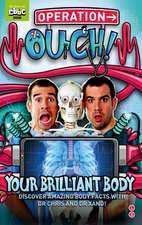Childhood, Memory and Autobiography in Holland: From the Golden Age to Romanticism: Early Modern History Society and Culture
Autor R. Dekkeren Limba Engleză Paperback – 13 ian 2014
Preț: 725.58 lei
Preț vechi: 906.98 lei
-20% Nou
Puncte Express: 1088
Preț estimativ în valută:
138.88€ • 150.91$ • 116.74£
138.88€ • 150.91$ • 116.74£
Carte indisponibilă temporar
Doresc să fiu notificat când acest titlu va fi disponibil:
Se trimite...
Preluare comenzi: 021 569.72.76
Specificații
ISBN-13: 9781349623792
ISBN-10: 1349623792
Pagini: 174
Dimensiuni: 140 x 216 mm
Ediția:Softcover reprint of the original 1st ed. 2000
Editura: Palgrave Macmillan UK
Colecția Palgrave Macmillan
Seria Early Modern History Society and Culture
Locul publicării:London, United Kingdom
ISBN-10: 1349623792
Pagini: 174
Dimensiuni: 140 x 216 mm
Ediția:Softcover reprint of the original 1st ed. 2000
Editura: Palgrave Macmillan UK
Colecția Palgrave Macmillan
Seria Early Modern History Society and Culture
Locul publicării:London, United Kingdom
Descriere
Between the 17th and 19th centuries auto-biographers and diarists invented new ways to write about childhood and children. At the same time, pedagogical ideas about child-rearing changed. This book looks at the connection between these developments. Egodocuments can bring the past alive, and allow us to sketch six intimate portraits. The second part of the book concentrates on the changes. Childhood became more highly valued as a phase of life. Children were taken more seriously. This is shown in chapters on child's play, punishment, wet-nursing and independence. Around 1800, in diaries, parents more openly grieved about the loss of a child, which indicates both a change of literary conventions and changes in the way emotions were felt and expressed. Finally, autobiographers wrote more and differently about their early years, and developed new memory strategies. Autobiographical texts are discussed within a wider cultural setting, using paintings, poetry, pedagogical tracts and novels. This book makes clear how changes in autobiographical style, the concept of childhood and the working of human memory are connected.
Notă biografică
Rudolf Dekker teaches history at the Faculty of History and Art of the Eramus University.





